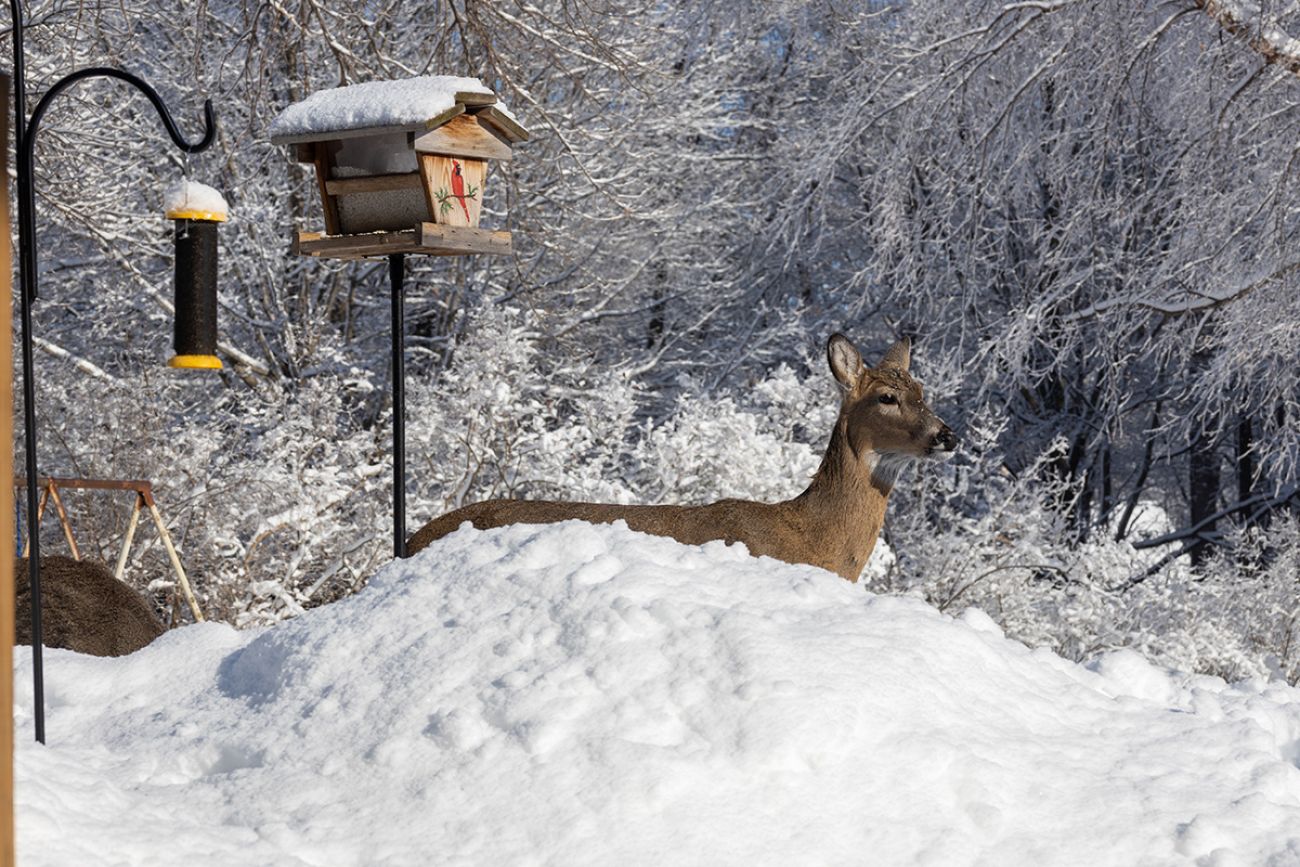Bill aims to allow backyard wildlife feeding, but critics fear deer disease

- State Rep. Ken Borton reintroduced a bill to protect residents who want to feed recreational wildlife and birds in their yards
- But wildlife advocates say that would encourage deer and elk to gather in one spot, which would allow disease to spread
- A similar bill was vetoed by Gov. Gretchen Whitmer in 2021
A northern Michigan lawmaker is taking another shot at legislation that would allow residents to feed birds and other small wildlife near their homes.
A similar bill was vetoed in 2021 by Gov. Gretchen Whitmer, who echoed the concerns of conservation groups that allowing people to spread feed in their yards would cause deer and elk to congregate regularly in one spot, leading to the spread of disease.
But state Rep. Ken Borton, R-Gaylord, told Bridge Michigan on Friday that House Bill 4593 is “strictly focused” on feeding small wildlife such as chipmunks, squirrels and birds, not baiting deer.
Related:
- Michigan officials propose changes to deer hunting regulations
- Few good options for shrinking Michigan’s problem deer herds
- Michigan officials propose changes to deer hunting regulations
“We live for the open air, pristine waters, and desolate forests – and that includes the wildlife that make their homes in this region,” Borton said in a statement earlier this week. “Folks should be able to feed animals without retaliation from the government. My plan protects residents simply hoping to enjoy nature.”
It’s unclear if Democrats, who assumed control of the Legislature this year, will be amenable to this argument.
The fear is that deer will gather to eat feed on the ground, Michigan House of Representatives Speaker Pro Tempore Laurie Pohutsky said Thursday.
Feeding and baiting bans were introduced in 2018 to prevent deer gatherings that promote the spread of chronic wasting disease (CWD), a highly contagious and fatal neurological disease. Whitmer and others have also expressed concern that such gatherings will spread bovine tuberculosis.
The new bill is Borton’s latest attempt to raise an issue he has been pursuing for more than a decade after he was ticketed for alleged deer baiting before he took state office.
In 2010, Borton live-streamed his backyard’s bird feeder but was ticketed when viewers assumed he was intentionally baiting deer and brought it to the attention of the Michigan Department of Natural Resources (DNR). Borton claimed his only intent was to feed local wildlife for his and his viewers’ enjoyment and his ticket was dropped.
Recreational bird feeding is not illegal in Michigan, but the DNR has issued recommendations on how to effectively feed birds without attracting deer and other wildlife.
What will House Bill 4593 do?
Borton’s bill would allow residents to place, scatter or distribute feed to wild animals under three circumstances:
- Feed must be placed either for recreational viewing or to prevent animal starvation
- Feed must be positioned within 300 feet of the residence
- No more than two gallons of feed may be placed or distributed at one time
Borton claims recreational wildlife feeding does not spread CWD, a point that is contested by state wildlife officials.
Putting out bird feed creates a “micro-hotspot” that attracts deer to gather and forces interactions that encourage the spread of CWD, Chad Stewart, the Michigan Natural Resources Commission, Deer, Elk and Moose Management Specialist, told Bridge.
“You are now exposing a whole group of animals to that pathogen and now the likelihood for spread is dramatically increased compared to if that bait site or feeding site doesn’t exist,” Stewart said.
The Michigan United Conservation Clubs (MUCC), an environmental group, also opposes the bill, viewing it as a way to bypass a feeding ban intended to avoid the spread of CWD and other diseases. The group said it only supports supplemental feeding during harsh winters in the Upper Peninsula.
“Feeding white-tailed deer and elk while chronic wasting disease and bovine tuberculosis continue to be present in our wild deer herd is like slapping science in the face,” said Nick Green, spokesperson for MUCC.
Why is wildlife feeding and baiting a hot topic?
Baiting and feeding deer are banned in the Lower Peninsula and in parts of three Upper Peninsula counties where CWD is a concern. In the rest of the U.P., deer baiting is allowed from Sept. 15 - Jan. 1. The penalty for illegally baiting or feeding deer is up to a 90-day misdemeanor and a fine of up to $500.
During a Michigan Natural Resources Commission meeting last week, Stewart recommended hunters can safely resume baiting deer in the Upper Peninsula’s CWD surveillance zone due to no new infection.
But CWD is not the only threatening deer disease: bovine tuberculosis is a disease equally as prevalent that can jump between animal species, potentially fatally affecting the cattle industry, and even humans.
The deer population is not projected to quickly decline from CWD. But as a slow and progressive disease, there’s potential for a gradual mass disease accumulation with more recreational wildlife feeding, Stewart said.
How to enforce Borton’s law?
A bird feeder is generally accepted for its intention, even though it might also attract deer, Stewart said. Residents putting large amounts of grain or seed on the ground would be seen as an obvious effort to attract deer, he said.
Borton acknowledged that it is possible if his law is passed that some people will falsely claim their intent is to feed small animals. But he said the bill’s two-gallon limit is “proof that they are not trying to attract deer.”
Pohutsky said, however, that two gallons is a considerable amount of feed that gives a larger opportunity for deers to gather and spread disease.
Does the bill have a chance to pass?
Whitmer vetoed a similar bill introduced by Borton two years ago, and another that overrode a deer and elk baiting ban in 2019, citing illness concerns.
“This legislation would’ve increased the chance of spreading wildlife disease within populations and the beef and dairy industries, which are vital to Michigan’s economy,” Whitmer said at the time. “That’s not a risk we can afford to take.”
Now as Democrats dominate Michigan’s state government, it seems unlikely this baiting bill will pass, but Borton said he remains optimistic.
“I don't have an issue working with the Democrats, I don't have an issue working with the governor,” Borton said. “Maybe she'll take another hard look at this and say, 'You know what? Feeding birds probably isn't the biggest problem we have in this state right now.'"
Michigan Environment Watch
Michigan Environment Watch examines how public policy, industry, and other factors interact with the state’s trove of natural resources.
- See full coverage
- Subscribe
- Share tips and questions with Bridge environment reporter Kelly House
Michigan Environment Watch is made possible by generous financial support from:
Our generous Environment Watch underwriters encourage Bridge Michigan readers to also support civic journalism by becoming Bridge members. Please consider joining today.
See what new members are saying about why they donated to Bridge Michigan:
- “In order for this information to be accurate and unbiased it must be underwritten by its readers, not by special interests.” - Larry S.
- “Not many other media sources report on the topics Bridge does.” - Susan B.
- “Your journalism is outstanding and rare these days.” - Mark S.
If you want to ensure the future of nonpartisan, nonprofit Michigan journalism, please become a member today. You, too, will be asked why you donated and maybe we'll feature your quote next time!






